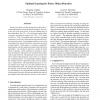Free Online Productivity Tools
i2Speak
i2Symbol
i2OCR
iTex2Img
iWeb2Print
iWeb2Shot
i2Type
iPdf2Split
iPdf2Merge
i2Bopomofo
i2Arabic
i2Style
i2Image
i2PDF
iLatex2Rtf
Sci2ools
126
click to vote
CVPR
2009
IEEE
2009
IEEE
Optimal scanning for faster object detection
Recent years have seen the development of fast and accurate algorithms for detecting objects in images. However, as the size of the scene grows, so do the running-times of these algorithms. If a 128 × 102 pixel image requires 20ms to process, searching for objects in a 1280 × 1024 image will take 2s. This is unsuitable under real-time operating constraints: by the time a frame has been processed, the object may have moved. An analogous problem occurs when controlling robot camera that need to scan scenes in search of target objects. In this paper, we consider a method for improving the run-time of general-purpose object-detection algorithms. Our method is based on a model of visual search in humans, which schedules eye fixations to maximize the long-term information accrued about the location of the target of interest. The approach can be used to drive robot cameras that physically scan scenes or to improve the scanning speed for very large high resolution images. We consider the l...
Computer Vision | CVPR 2009 | General-purpose Object-detection Algorithms | Image Requires 20ms | Robot Cameras |
Related Content
| Added | 18 May 2010 |
| Updated | 18 May 2010 |
| Type | Conference |
| Year | 2009 |
| Where | CVPR |
| Authors | Nicholas J. Butko, Javier R. Movellan |
Comments (0)

